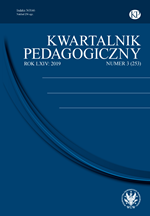„Społeczeństwo dla wszystkich”, czy tylko „szkoła dla wszystkich” – opinie nauczycieli szkoły specjalnej, integracyjnej i ogólnodostępnej
“Society for all” or just “school for all” – the opinions of teachers from special, integration and regular schools
Author(s): Monika SkuraSubject(s): Social Sciences, Education, Psychology, Communication studies, Sociology
Published by: Wydawnictwa Uniwersytetu Warszawskiego
Keywords: inclusive education; special education; integrated education; teacher of students with SEN; special educational needs
Summary/Abstract: Teachers play a vital role in students’ intellectual and personal development, hence they helpto prepare citizens. Therefore, it is worth asking what their views are on a “perfectly inclusive”world vision. To analyse the teachers’ perception, the study explored two areas: their outlookon an inclusive society and the importance of an inclusive education for marginalised groups.The research comprised teachers working with Special Educational Needs (SEN) students:55 from integration schools, 48 from regular schools, 45 from special schools (those withintellectual disability (ID) and autism). The data was collected using a questionnaire.The findings highlighted that all groups thought that people with disabilities primarilyneeded help and support, special school teachers felt most strongly about this. Specialeducational needs teachers most strongly disagreed that their group were afraid of thedisabled or felt hostility towards them compared to the other two groups. All groups hadmilder opinions regarding other types of marginalised people. The majority of special schoolteacher’s had views similar to general society regarding that the presence of refugees insociety could pose a danger, whilst most teachers from regular schools thought that refugeeswere here for work and social care.In light of the study, all groups agreed that regular schools were not the best place forpupils with SEN, however they would make an exception for students with mild disabilities,the children of refugees, and those from national and ethnic minorities. Special schoolsteachers working with students with severe disabilities strongly agreed that students withan ID and autism generally, should stay in the separated model of education. All groups regarded that the goal of an “education for all” was an unrealistic expectationespecially in the near future, just as the goal of an “inclusive society”.
Journal: Kwartalnik Pedagogiczny
- Issue Year: 253/2019
- Issue No: 3
- Page Range: 119-138
- Page Count: 20
- Language: Polish
- Content File-PDF

